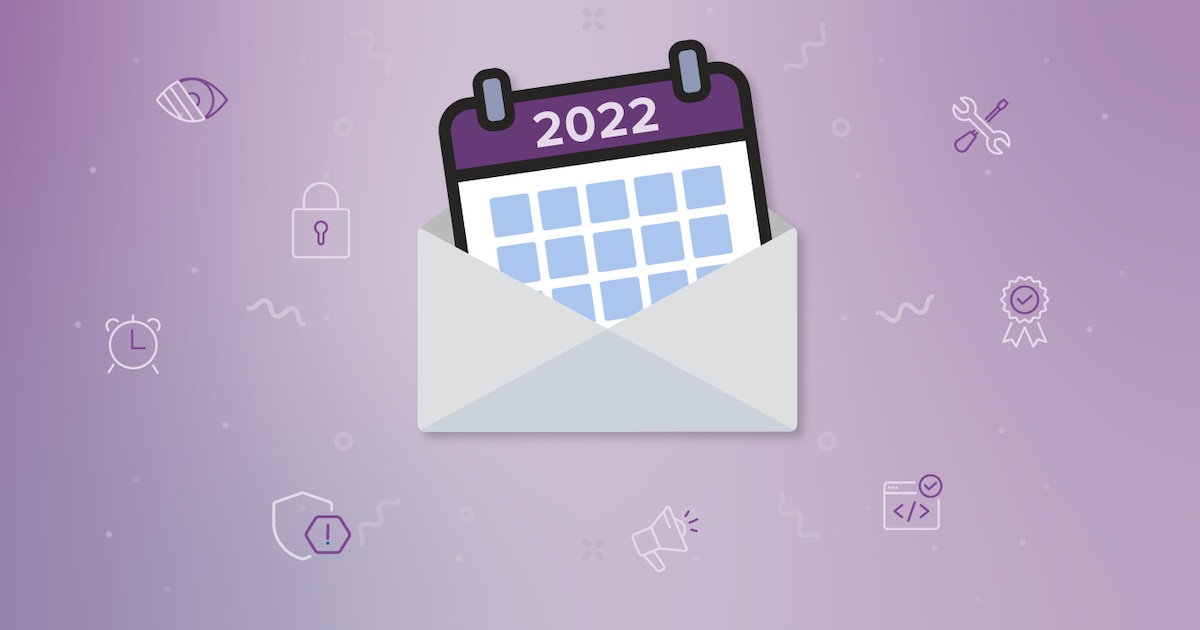Did you know that on average, 1.5 billion email opens were recorded for each month this year? That’s 490 million more email opens than last year’s average (of 1.01 billion emails opens per month).
With such a high volume of email opens, it got us thinking about the year in email marketing as we wrap up 2022. How did email marketing change over the past year—and what caused those changes?
Join us as we take a look back at 2022’s biggest email marketing headlines and how they changed the future of email marketing.
(Stay tuned next month as we kick off our monthly blog series about the latest happening in the world of email.)
TLDR: crypto security threats, data breaches, a big year for BIMI, and a lot of updates from Google.
January
- Austria’s Data Protection Authority (DPA) declares the use of Google Analytics unlawful based on European Union General Data Protection Regulation (EU GDPR) regulation.
- Google announces Gmail’s new layout: a new integrated view featuring email, Google Meet, Google Chat, and Spaces in one place.
- Google requires all legacy G Suite users to transition to a paid subscription of Google Workspace this year.
February
- Google announces plans for privacy change similar to Apple’s, which wiped $230 billion off Facebook’s market cap.
- France’s Data Protection Agency (known as CNIL) finds the use of Google Analytics non-compliant with the EU GDPR.
March
- Google announces transition to new Google Analytics 4.
- HubSpot confirms an unauthorized third-party gained access to a portion of their client data.
April
- Mailchimp confirms hackers used an internal tool to steal data from over 100 of its clients, with the data being used in phishing attacks on the users of cryptocurrency services.
- Google delays when legacy G Suite users would have to start paying, with a no-cost waiting list option underway.
May
- The Email Markup Consortium (EMC) is born—a community group working to improve the user experience, accessibility, performance, consistency, and reliability of email markup.
- ActiveCampaign acquires Postmark and DMARC Digests.
- Microsoft starts rolling out “One Outlook,” a new Outlook email client for Windows, to beta testers.
June
- Google gets green light to exempt political email campaigns from spam detection for proposed pilot program from the Federal Election Commission (FEC).
- Popular NFT marketplace OpenSea warns users of email phishing after a major data breach.
- Mozilla Thunderbird shares plans to develop a full-featured email client for Android devices in collaboration with the K-9 Mail Project.
- Internet Explorer 11 desktop application ends support on certain versions of Windows 10.
- Italy’s DPA finds use of Google Analytics to be non-compliant with EU data protection rules.
July
- Google announces postponement of its phase out of third-party cookies in Chrome to the second half of 2024.
- The FEC receives hundreds of negative comments on a Google pilot program that would protect campaign emails from being automatically filtered as spam.
- Google Workspace updates Gmail with new integrated marketing tools to send emails to large audiences.
- The EMC’s report on email accessibility finds that 99.9% out of 35,604 HTML emails tested contain accessibility issues categorized as “Serious” or “Critical.”
August
- Customer.io acquires Parcel, an email coding platform.
- Mailchimp security breach compromises customer email addresses of cloud infrastructure company DigitalOcean.
- Klaviyo and Shopify establish a strategic partnership.
- Klaviyo confirms they experienced a data breach in their system related to cryptocurrency activities.
September
- Apple joins list of companies implementing Brand Indicators for Message Identification (BIMI).
- La Poste announces support for BIMI.
- Amazon launches free email marketing capabilities for sellers.
- Adobe acquires Figma—Adobe’s largest acquisition to date.
- Halfords is fined for sending nearly 500,000 unwanted marketing emails.
October
- Yahoo adds inbox management tools to its mobile app, including feature like “Free Trial” Tracker, Updated Package Tracking Alerts, and Receipts View.
November
- Yahoo adds BIMI “verified checkmark” on iOS and Android apps next to sender logos.
- Gmail announces it will add package tracking features to help users stay on top of shipments.
December
- Editorial newsletter tool Revue announces its official shut down on January 2023.
- GetResponse acquires Recostream, an AI-driven personal recommendation engine.
That’s a wrap, 2022
Another year in the books for email marketing! Want to stay up-to-date with more email industry updates like this? Sign up for Litmus Weekly, featuring the best content from the world of email, the email community, and the Litmus blog—delivered to your inbox every Thursday.
The post A Look Back at 2022: The Year in Email Marketing appeared first on Litmus.

